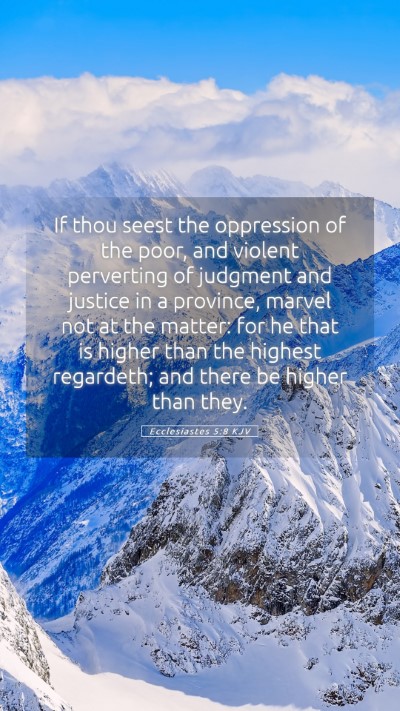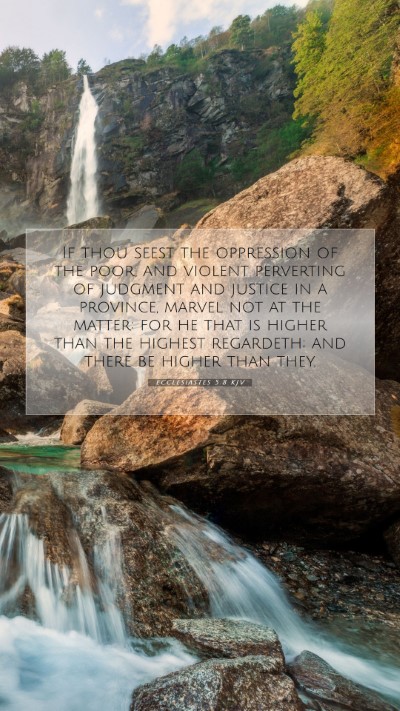Understanding Ecclesiastes 5:8
Ecclesiastes 5:8 states: "If you see the oppression of the poor and the violation of justice and righteousness in the province, do not be astonished at the matter; for the high official is watched by a higher, and there are yet higher ones over them.” This verse highlights the themes of social injustice and the complex hierarchy of authority.
Bible Verse Meanings
In exploring the meaning of Bible verses, Ecclesiastes 5:8 serves as a sobering reminder of the realities of life. The verse speaks to the observer's experience of witnessing injustices and oppression, urging them not to be surprised. According to Matthew Henry's Commentary, this indicates a recognition that human systems often have inherent flaws, and injustice is a recurring theme throughout history.
Contextual Analysis
Biblical exegesis of this verse involves understanding the historical context in which it was written. Scholars, such as Albert Barnes, point out that the author of Ecclesiastes critiques both the moral failures of society and the apathy of those who witness these injustices. It suggests that those in power often perpetuate the cycle of oppression, yet this should not lead to despair, since there is a divine perspective on justice.
Insights from Adam Clarke
Adam Clarke's Commentary emphasizes that the social order is complex, with layers of authority that can obfuscate justice. The verse encourages readers to maintain awareness of these structures, reminding them that accountability ultimately resides with God, who sees all injustices—even those hidden from human perception.
Spiritual Application
In terms of applying Bible verses to daily life, Ecclesiastes 5:8 prompts believers to confront injustice actively rather than passively observing. As a community, they are encouraged to engage in acts of compassion and righteousness, standing against the oppression of the marginalized.
- Role of Observers: Believers are called to remain vigilant and responsive to social injustices.
- Divine Oversight: Trust that God sees all injustices, and ultimate judgment prevails over human mismanagement.
- Community Action: Advocate for the powerless and support systemic changes to address injustices.
Cross References
This verse resonates with other scripture passages that address the themes of justice and oppression:
- Proverbs 31:8-9: Urges speaking up for those who cannot speak for themselves.
- Isaiah 1:17: Encourages learning to do good, seeking justice.
- James 5:1-6: Warns the rich against oppression of the poor and the consequences they face.
Bible Study Insights
When engaging in online Bible study or within Bible study groups, Ecclesiastes 5:8 can serve as a powerful discussion topic. Facilitators can guide participants through the implications of witnessing injustice and what scriptural responses should be, fostering deeper Bible study lessons focused on justice, morality, and societal advocacy.
Conclusion
In summary, Ecclesiastes 5:8 not only serves as an observation of societal flaws but also calls believers to proactive faith. By understanding this verse through various commentaries and historical context, individuals can deepen their understanding of Scripture and reflect on their role in fostering justice in their communities.


